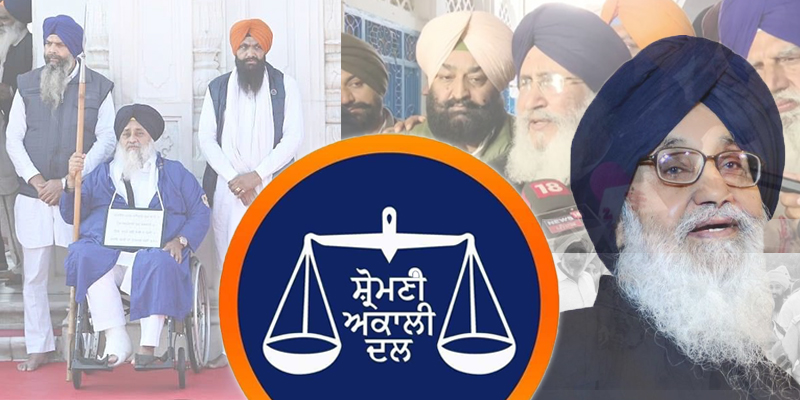
By Gurnam Singh | Opinion |
December 2, 2024, marked a watershed moment in Punjab’s political and religious history. On this day, the Akal Takht, the supreme temporal authority of the Sikhs, decisively intervened in the affairs of the Shiromani Akali Dal (SAD), symbolically ending the decades-long dominance of the Badal family over the party and its ideology. The Takht’s five Jathedars, in an extraordinary move, summoned SAD’s leadership and demanded public atonement for the party’s alleged “gunaah” (crimes) committed during its time in power.
At the heart of these accusations lay the party’s inability to prevent the sacrilege of the Guru Granth Sahib during its tenure—a failure that deeply hurt Sikh sentiments. Former SAD President Sukhbir Singh Badal bore the brunt of the criticism, but the late patriarch, Parkash Singh Badal, was not spared. The withdrawal of the prestigious Panth Rattan Fakhr-e-Quam title previously conferred upon him underscored the gravity of the Akal Takht’s stance.
This public reprimand, coupled with the SAD’s years of political mismanagement, corruption allegations, and detachment from grassroots Sikh concerns, has brought the party to the brink of irrelevance. Once the bastion of Panthic values and Punjabi nationalism, the Akali Dal today finds itself at a crossroads.
The Challenges to Revival
For SAD or any reformed Panthic party to regain its lost stature, it must confront several formidable challenges:
First, there is the issue of erosion of trust amongst the Sikh masses: The Badal family’s hold over SAD transformed the party from a movement representing Sikh interests to a power-centric entity embroiled in controversies. The sacrilege incidents, coupled with poor governance, created a chasm between the party and its traditional voter base. Restoring trust will require more than apologies—it demands tangible action and visionary leadership.
Secondly the new party faces intense competition from AAP and Congress. The emergence of the Aam Aadmi Party (AAP) as a dominant political force in Punjab, combined with the Congress’s renewed focus on Sikh issues under leaders like Rahul Gandhi, has dramatically reshaped the state’s political landscape. Both parties are already capitalizing on the vacuum created by SAD’s decline.

And perhaps the greatest challenge is unifying the many factions that have emerged in the chaos left by the Akali Dal. Internal divisions within Sikh religious and political factions have further weakened the Akali Dal’s ability to unify the community. The lack of a cohesive Panthic agenda makes any revival effort significantly harder.
Last, given the shifting demographics, there is the question of how to inculcate broader Punjabi sentiments. SAD’s traditional focus on Sikh-centric issues may no longer suffice in a state where non-Sikh voters, particularly Hindus, Dalits and the increasing number of Christian converts, play a crucial role. A narrow Panthic approach risks alienating these key demographics.
The Path Forward: A New Vision for Punjab
While the odds are stacked against SAD, a resurgence is not entirely out of the question. For this to happen, however, the party—or a new formation—must reinvent itself.
The first priority will be to establish a new leader for a new era. The Akali Dal desperately needs a charismatic leader untainted by past controversies, and one that can hold their own on an international stage. This individual must bridge the generational gap, embody integrity, and inspire both Sikh and non-Sikh voters.

Another challenge is to reconstitute the political project of the new party which must be rooted in a broader nationalism. Building on the widespread alienation with the centrist policies of the Bharatiya Janata Party (BJP), the new party’s future lies in championing a Panjabi nationalist agenda that resonates across communities. Given the inclusive and broadly secular nature of Sikh philosophy, combining a Panthic agenda and a Panjabi nationalist agenda is perfectly possible. A modernized version of the Anandpur Sahib Resolution, focusing on religious freedom, federalism, human rights, social justice, and anti-Hindutva sentiment, could provide a fresh ideological framework.
The now defunct Akali Dal always prided itself as being a pro-farmer party. The issue of rights and economic justice for Punjab’s farmers remain at the heart of the state’s socio-economic fabric. Building on the momentum of the 2020-21 farmers’ protests, a Panthic party could reclaim relevance by advocating for agrarian reforms, fair pricing, and environmental sustainability.
If there is one issue that united the people, that is governance and corruption. A new party will need to institute social and institutional reforms on a radical scale. Indeed, one of the many failures of the AAP has been on the issue of corruption, which was one of their main manifesto pledges. To regain moral authority, any future Panthic party must prioritize transparency, accountability, and democratic functioning within its ranks. Partnering with civil society organizations to address issues like drug addiction, unemployment, and caste discrimination could help rebuild public trust.
The Road Ahead
The fall of the Badal dynasty offers a unique opportunity for introspection and reinvention. The Akali Dal, once a torchbearer of Sikh and Punjabi aspirations, can either fade into obscurity or rise phoenix-like from the ashes of its past mistakes.
Whether this resurgence comes from a reformed Akali Dal or a completely new Panthic movement, one thing is clear: it must move beyond narrow sectarianism and embrace a broader, inclusive vision for Punjab. This vision must honor the state’s pluralistic heritage while addressing the socio-economic challenges of the present.
The call for forgiveness issued by the Akal Takht is both a rebuke and a chance for redemption. Only time will tell if Punjab’s Panthic leadership has the humility to seek forgiveness and the courage to rebuild.

Gurnam Singh is an academic activist dedicated to human rights, liberty, equality, social and environmental justice. He is an Associate Professor of Sociology at University of Warwick, UK. He can be contacted at Gurnam.singh.1@warwick.ac.uk
* This is the opinion of the writer and does not necessarily represent the views of Asia Samachar.
RELATED STORY:
The Demise of the Akali Dal and the Badal Dynasty: What Next for the Panth? (Asia Samachar, 5 Aug 2024)
ASIA SAMACHAR is an online newspaper for Sikhs / Punjabis in Southeast Asia and beyond. You can leave your comments at our website, Facebook, Twitter, and Instagram. We will delete comments we deem offensive or potentially libelous. You can reach us via WhatsApp +6017-335-1399 or email: asia.samachar@gmail.com. For obituary announcements, click here
































